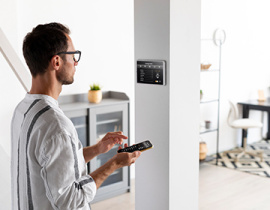A Living Space That Reflects Who You Are
In today’s world, the terms “home” and “living space” are often used interchangeably. However, there are significant differences between these two concepts, not only from an architectural standpoint but also emotionally and socially. When considering the difference between home and living space, we realize that it is more than just architecture; it’s a complete lifestyle that incorporates emotional and social aspects. So, what is more important to you: a place to simply live, or an atmosphere that reflects who you are?.jpg)
Spaces That Reflect Your Identity
Each of us carries memories associated with specific spaces. The scent of the house where you grew up, the balcony where you had your first coffee, the room where you woke up on holiday mornings... These moments show the emotional value of a home and how strongly we form emotional bonds with our living spaces. A home is where identity and belonging are shaped.
Your living space is not limited to four walls; it reflects your world. From your decoration style to color preferences, from your bookshelves to your coffee mugs, everything tells your story. Your living space shapes your identity, representing the world you live in and your values. For example, your books, favorite colors, art pieces, or collections are traces of your personality. This answers the question of how your living space shapes your identity.
A Space That Feels Like Home
Feeling safe at home is crucial, especially in modern city life. The peace you feel after a stressful day comes not just from silence, but from the sense of belonging to your space. The psychological impact of living spaces is just as important as comfort, and it plays a key role in fostering emotional stability.
The peace you feel when sipping your coffee in your corner... That moment is not just about physical comfort; it’s about finding inner balance. A living space is more than just four walls—it’s the place where you feel most at ease and emotionally secure. What makes a house a home is not the size or the structure, but the emotional connection and sense of belonging you build within it. This is why a “home that understands you” is more than just a house; it becomes a place where you can escape the noise of the outside world and find emotional balance. Therefore, the benefits of a permanent living space go beyond physical comfort, encompassing emotional and spiritual well-being as well.
More Than Just Living – It’s About Sharing
A home is not just an individual comfort zone; it is also a center where family dynamics and living space play a crucial role in forming social bonds. The true value of a home is revealed through moments shared not only with yourself but also with loved ones. Social bonds and home life often manifest in shared spaces such as the dining table, a living room where children play, or a terrace where guests are entertained.
Does home influence family relationships?
Absolutely! The time spent in a home strengthens the relationships between family members. Modern solutions such as open-plan kitchens, large living areas, and increased shared spaces allow for more interaction, shared moments, and family bonding. This transforms your living space into much more than just a “place to stay.”.jpg)
Home is a place where life passes quickly, where everyday concerns fade behind, but where each of the moments shared here leave lasting traces. Over time, homes can become not just places of shelter, but dynamic spaces that adapt to the rhythm of our lives and reflect our personality. If you're looking for the right place to live, it's worth taking a look at these inspiring guides to different cities. Click here to discover cities where foreigners are happy.
Comfort vs Functionality in Homes
The delicate balance between comfort and functionality in homes directly affects your quality of life. Simply creating an aesthetically pleasing space is not enough; it must also be practical, ergonomic, and functional. This balance enhances your daily life and reduces stress.
Here’s where functional home design ideas come into play: proper lighting, ergonomic furniture, open color schemes, and smart storage solutions. For example, in small spaces, smart storage systems keep your home organized, allowing both your eyes and your mind to relax. Modular furniture, which adapts to the functional needs of each room, ensures your home fits your lifestyle.
All of this answers the question of how living space affects well-being: the more functional your living space is, the more peace and satisfaction you will feel in it. The time spent in a home becomes meaningful not just through physical comfort, but by the order and functionality within it.
More Than Just a Place to Live – Home as Investment and Lifestyle
A commonly asked question is: “Is buying a home an investment or a lifestyle choice?” The answer depends on both perspectives. In the debate of home investment vs lifestyle, we must consider not just the numbers but also the emotional value the home brings.
Sometimes, a home chosen for its emotional comfort provides much more value than any financial return. The memories you create within those walls will last far beyond any financial gain. A home is not just four walls—it’s a place where personal peace, security, and a sense of belonging are built. Therefore, when deciding whether a house is just a place to live or something more, your lifestyle and values should play a key role in the decision-making process.
In addition, a stable home offers health benefits, as it provides emotional well-being and a sense of security. This sense of stability can significantly improve both mental and physical health, fostering overall well-being. When a person feels secure in their living space, their mental and physical health can improve, fostering a greater sense of overall stability..jpg)
Today, homes have become dynamic spaces that adapt to the changing rhythm of life. Adaptable living environments such as modular furniture, convertible rooms, flexible layouts, and designs that evolve with time allow your home to shape itself alongside your lifestyle.
Can a Rental Feel Like Home?
Absolutely yes! Because emotional connection to home is not about ownership—it’s about how the space makes you feel. Whether you own or rent a property, the sense of security in housing comes from the emotional bond you create with the place. A rental home can become just as much of a home as an owned one because the emotional connection to a place is what truly matters. The meaning of home is not determined by the deed but by the feelings it evokes.
Why emotional connection to a home matters is that it’s this very bond that transforms a space into a sanctuary—where you can relax, feel at peace, and truly belong.
Home is Not Just a Physical Space, It’s a Real Life
Ultimately, the importance of home and well-being lies in the peace and meaning that your living space provides. When physical spaces meet your emotional needs, a real "home" is born. A home is not just shelter but a representation of your identity and personal space. In short, the answer to how home affects happiness is shaped by comfort, harmony, security, and meaning. Every detail, every corner, and every room that resonates with your essence contributes to true happiness.
This is why we offer you more than just a home—we offer you a lifestyle. Your home is not just a place to start; it’s a platform for shaping your life.
Why does emotional connection to a home matter? Because a true home is where happiness and well-being are nurtured.
If you are looking for an inspiring example, check out the story of a family who changed their lives in Alicante.









